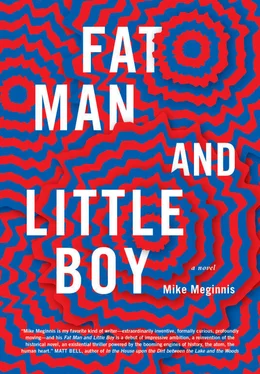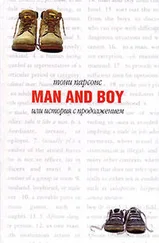Now the referee throws into the air stalk after stalk. A continuous parade of samurai runs across the stage, leaping to cut the bamboo, flipping over each other, sliding on their silk-sheathed knees, swords whispering past one another, never touching. They grunt and shout. The unseen piano player pumps his left hand like a bellows, his right hand like pistons. The keys shriek. Gong gongs.
Everyone is here. The policemen, Messieurs Bruce and Rousseau, sit toward the back of the auditorium, hands ready on their truncheons. They watch the stage as if they anticipate a crime, their chins upturned and eyes narrowed. Jacques is here, and so are his regulars, and so are the waiters. So is every woman Fat Man has dreamed about since they came to town—the brunette with her hair done up in a tight bundle, the teenage girl with a handkerchief holding her red curls in place, the blonde with eyelashes like hummingbird wings.
Having only seen Mr. Blanc in passing, and from a great distance, Fat Man can still discern him now. He recognizes Blanc by the pumpkin-like shape of his head, the way his eyes never fully open, owing to the prodigious fat of his cheeks; he recognizes Blanc by the quizzical weight of his brow, nearly one continuous arch, and by the way he sits with his hands at rest on his gut, all his fingertips touching their opposite palms. He recognizes Blanc by the slump of his widower’s figure. If they were shaking hands, he is sure Blanc’s face would be transformed by proximity, by unseen moles or lines or other features, such that he would not recognize Blanc, or suspect that they had ever known of one another.
In the time it takes for Fat Man’s gaze to return to the stage, the samurai are gone and so is their bamboo. He missed the roar of applause that followed their finale. Now, the Oriental spirit medium approaches.
She is a tall, slender figure in robes shot through with brilliant color like thick veins of quartz. The robes trail her like the train of a wedding gown, though they are black and bright purple and jelly red and silver and gold and forest green and tiger orange and sun yellow. Her robes are open at the shoulders, revealing the kind slope of her collarbone, the fairness of her skin. There are no sleeves apart from knots tied just beneath those exposed shoulders. She wears a large silver necklace hung with obsidian and pearls. Her black hair is piled atop her head in a tight, thick knot. One long strand falls down her back, mingling with jade beads and bits of precious metal that dangle from a comb.
She walks to the velvet-draped table. She sets down a small, featureless wooden box—about eight inches long on each side. There is, on closer inspection, a wooden slat on the top of the box with which it could be pulled open. From the ease with which she carries it and the softness of its landing on the table, Fat Man thinks it must be very light—perhaps empty.
The medium bristles with peacock feathers. Or rather, they seem to be feathers but Fat Man sees that they are long, silver needles done up with plumes like peacock tails. There are needles in her arms and shoulders, which must puncture her perhaps an inch deep. They stand wholly erect. As she breathes, the needle-feathers flex and sway. There is one between her eyes and like a quail’s headfeather it droops forward.
The medium folds her hands. She breathes through her nose and mouth together. Deep, deep.
The invisible piano player fingers a mystic mood.
The medium unfolds her arms and gestures violently offstage. She shouts—her voice resounding, deep as the afterlife, deep as a fortune-teller’s should be—“I told you not to play that shit once I came out! I won’t have it!”
Several men exchange words offstage. The piano player stops, though not without striking the keys one more time.
“Unlike everything you have just seen,” says the medium, in perfect French, “unlike everything else on this stage, and unlike what they tell you in church services or funerals—unlike all of these things, I am real. What I do is real.” She strokes the wooden box. Her nails are long, elegant, and speckled all the colors of her robes.
“Tonight I will speak to you of the dead, and the dead will speak to you through me. If you don’t like what you hear, this is not my fault, and I don’t wish to hear of it. If you do like what you hear, I am happy for you, but you cannot expect me to speak to you of them again—or to speak to you otherwise, for that matter. Is this understood?”
Fat Man nods. He feels and hears most of the audience do the same. His eyes are fixed on her. There is a prickling all over his skin, and inside it, an itch, like he too is hedgehogged with peacock needles.
The medium says, “Now I’m going to begin. I’m sorry I won’t be able to help all of you. Time and my own limitations allowing, I’ll do what I can.”
She places one hand on the box and with the other points out at the audience, as if extending an antenna for the dead. All her feathers shiver. She says, “I’ve got something. You, there. The one who brought a dog.”
An old woman in the back says, “Me?”
The medium nods and says, “Why do you bring that dog everywhere?”
“He reminds me of my husband,” says the old woman. “Are dogs not allowed? No one told me.”
“Do you believe the dog is your husband, madame?”
“The thought has occurred to me. He’s always so attentive, as if he means to make up for some slight he has done me in the past. A past life, maybe. They share the same sad little eyes.”
“The dog is not your husband. He tells me that he is your former grocer.”
The old woman gasps. “Who?”
“He says you never learned his name, but describes himself for me now. He says he was a middle-aged man, and that when he was not at work he wore a white felt hat around town. His hair was red, and his mustache streaked with blond, and his shirts were always stained with the pulp of squashed fruits. He wants you to know he didn’t choose to be your dog, but he did love you in life, and now he’s happy to be yours.”
There rises over the audience a heavy, steady panting—the dog. He yaps once.
“Well that doesn’t make any sense,” says the old woman. “Why should some infatuated grocer be my dog? Why should he look so much like my husband?”
The medium ignores her. “I have a message for Rosie Cummings, from your father. He says you should go back to America. Forget about your fool hotel. He says it’s too soon for you to give up on children.”
A tall American woman in a blue frock and curly red hair stands up several rows in front of Fat Man and company.
“Can you tell him I’m barren?” she says, in a flat, Midwestern accent that comes through her nose as much as her mouth.
“He says that’s your imagination. He says the women in your family have always taken to childbirth very naturally.”
“Forget him. Can you hear my husband? Does he have anything to say for himself?”
“No, ma’am. I can’t hear him,” says the medium.
“It figures,” says the American, and she sits down.
“Now I—”
“Wait,” interrupts Rosie, standing up again. “I’m sorry, but concerning America and my hotel and what my father said, is it your experience that the dead are, on the whole, more wise than the living?”
“Not at all,” says the medium.
“Okay, thank you,” says Rosie, and she sits down again. Her chair makes a sound like a hinge.
The medium stands and paces the front of the stage, eyeing the audience. When her gaze passes over Fat Man the prickles in his skin intensify, and when she has moved on he sees that he is holding hands with Little Boy, who looks up at him in amazement, and some kind of guarded tenderness, which suggests to Fat Man that he’s the one who reached for his brother.
Читать дальше












